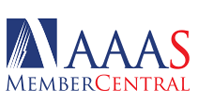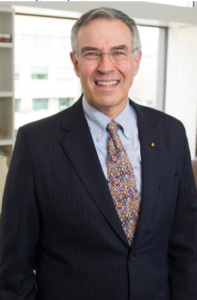 It’s been nearly a year since retiring U.S. Congressman Rush Holt (D-NJ) became the 18th Chief Executive Officer of AAAS, succeeding Alan I. Leshner. The former professor of physics and public policy took the reins with characteristic gentility—and zeal about the need for evidence-based decision-making in the halls of Congress, in classrooms, and among an increasingly misinformed pubic.
It’s been nearly a year since retiring U.S. Congressman Rush Holt (D-NJ) became the 18th Chief Executive Officer of AAAS, succeeding Alan I. Leshner. The former professor of physics and public policy took the reins with characteristic gentility—and zeal about the need for evidence-based decision-making in the halls of Congress, in classrooms, and among an increasingly misinformed pubic.
On an uncharacteristically warm day in December, Holt took a moment to meet with MemberCentral editor Selby Frame to share his impressions on the concerns of the scientific community and his vision of the role AAAS should play moving into the future.
AAAS MemberCentral: Tell us a bit about what your charge has been during this first year.
AAAS CEO Rush Holt: Well, it certainly is multifold. In addition to maintaining the excellent publications and programs, the Trustees placed on me the responsibility of enacting changes in the organization: moving into 21st century communication, becoming digital-first, and to recapture the origins of AAAS by focusing more on our members.
We were founded more than a century and a half ago by members from many disciplines who banded together to advance the idea of science and to ensure that the practices of science were carried out responsibly and fairly and to the benefit of all people. Our essence goes beyond the individual disciplines to show that science in general is important to the world at large and can result in a better quality of life for people. We highlight what scientists bring practically and culturally to the world.
MemberCentral: How do we recapture the origins of the AAAS mission today—particularly in this age of specialization?
Holt: Especially in this age of hyper-competition and great specialization there is a need for an association that provides perspective, that reaches across all disciplines, that looks at science writ large.
 To some extent we do that every week in Science magazine, which people love. There is nothing like Science in quality and breadth and clarity. Even if you never look at the research articles, the policy discussions, the summaries of the research articles, the news about AAAS activities, the letters, the editorials, the opinion pieces, are well worth the price of membership.
To some extent we do that every week in Science magazine, which people love. There is nothing like Science in quality and breadth and clarity. Even if you never look at the research articles, the policy discussions, the summaries of the research articles, the news about AAAS activities, the letters, the editorials, the opinion pieces, are well worth the price of membership.
And there are many other reasons to maintain one’s membership. Members only sometimes recognize that AAAS is also, day in and day out, conducting programs in public engagement, training scientists in communication, developing programs in education, in the pre-college area, in university, and in professional development and career enhancement. We have programs in science and the law, science and international relations, science and religion.
We also have an S&T Policy Fellows program that places Ph.D.-level professional scientists into government for a year or two. This year we have 268 early-career, mid-career, and late-career scientists who are in the State Department, USAID, National Science Foundation, the Army Corps of Engineers, Commerce, Justice, and 16-odd agencies and congressional offices. And for 45 years, as the program has grown, it has brought technical expertise to the policy-making and regulatory agencies and brought political savvy back to the professions. It has also shown scientists and engineers everywhere that there are very reputable alternatives to academic or industrial bench science.
MemberCentral: You’ve spent a good deal of time in your first year meeting with AAAS members and others in the scientific community—during Town Hall Meetings and in your regular travels. What is your sense of what concerns members most?
Holt: I think many members want AAAS to remember that it is a membership organization, and they want to know that AAAS is engaged in the politics and priorities that can help them do their work. And they want to see AAAS forcefully involved in public issues that are informed by science in policies, in government, in daily living.
I find that many members are concerned with what they see as an erosion of the appreciation of science and a growing willingness in society to ignore evidence, to hold debates and discussions on the basis of assertion and opinion rather than an evaluation of the evidence. America over the centuries has been a very pragmatic, evidence-based population, and as scientists whose careers live and die on the basis of evidence we wish that we could bring that reverence back.
I think that many members get upset that families would deny their kids vaccination and that students would be deprived of teaching of the central organizing principles of biology, like evolution. I also hear exasperation from members wondering how people from Capitol Hill can be so misguided. The problem there, I would argue, is a much bigger societal issue. What you see in members of Congress is simply a reflection of society at large, in their misunderstandings, misapprehensions, and misinformation about science.
To address this larger societal problem is a huge challenge, but who better than AAAS to address that problem?
MemberCentral: What are some of the ways that AAAS is remediating the tide of misinformation that is eroding public support for science?
Holt: Well, we have programs on the science of science communication that incorporate studies on how people listen and how people learn. We have seminars teaching scientists that what is taught is not what is necessarily learned and what is learned is not necessarily understood. And if we’re trying to show what science is, what science does, and how science can benefit the citizen in her daily life, it’s not enough to say that we need better science teaching in schools. We are working to integrate better appreciation and understanding of science throughout society.
From the beginning we have spoken out as an organization on ways to help science thrive and to make sure that fairness and integrity govern the practice and application of science. Almost at every stage, AAAS has advocated for good science practice. In the 1880s, for instance, following a paper that was presented at a AAAS annual meeting, the leadership of AAAS called for scientific management of America’s forests. And that ultimately resulted in the U.S. Forest Service. More recently, AAAS has been instrumental in documenting destruction of world heritage sites in Syria using high-resolution satellite imagery.
We’ve been involved in most of the major issues underpinning science: making sure that genetic manipulation is done in a safe way, whether we’re talking about plants or animals. We’ve been involved in advocacy with respect to climate change. We are out front on the teaching of evolution.
MemberCentral: What do you see that AAAS could do better?
Holt: The reputation of AAAS is very good, and deservedly so. Whether someone is a member, has let their membership lapse, or never was a member, they by and large have a very good opinion of AAAS—and yet a rather poor understanding of what we do. To some extent, we have taken members for granted and they have taken us for granted, and the public should know us better.
There are tremendous benefits to being a member – I actually think the greatest is to know that AAAS, the force for science, is at work. But we can do a better job telling members about the value they get. Whether it’s our career-oriented seminars, or opportunities to be engaged in policy or education on the local or national level, or even our discount for a car purchase. There ARE benefits and we want members to know about that.
We are working very hard to engage members, to draw on their expertise and knowledge and hopes. Our honored Fellows, for instance, are a very distinguished group of people whom we could and should engage more thoughtfully. They have enormous expertise that’s important for the governance of our country and for advancing our society.
I also would like to see us develop more vehicles that address the joy and wonder of science. There was a recent review of postdocs that showed that there are a lot of scientists at that stage of their career who feel that the joy has gone out of science in their daily work. We want to make sure that postdocs do their work with the same sense of fulfillment that led them into the studies in the first place.
MemberCentral: So, what is your level of optimism about the future of science and the role AAAS can play in that?
Holt: The scientific way of thinking—evidence-based, publically critiqued—is still our best hope for the future: for our economy, our culture, and our society. It’s great to be working in this subject area. AAAS is a great organization that for more than a century and a half has been the most respected and highly regarded organization of its kind. There’s important work to be done and we’ve got the best vehicle to do that work.
It’s a lot, as it should be. We are the world’s premier general science membership organization. We do have high ambitions—and coming to AAAS, I seek to realize those ambitions.
— By AAAS MemberCentral Writer Selby Frame, Wednesday, January 13, 2016
Photo: Chet Susslin/National Journal